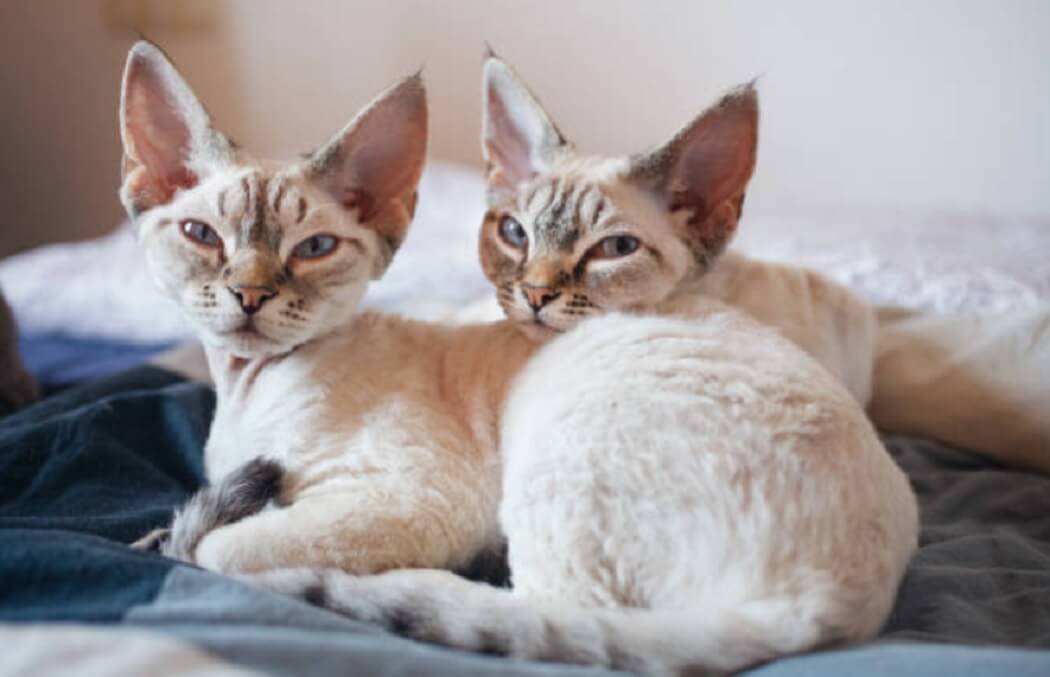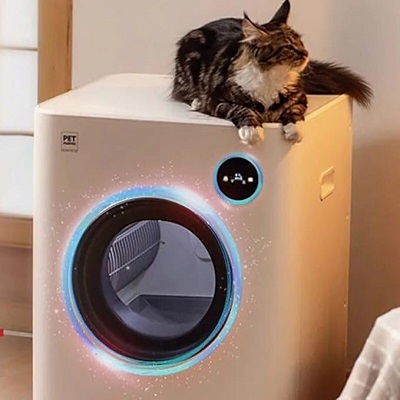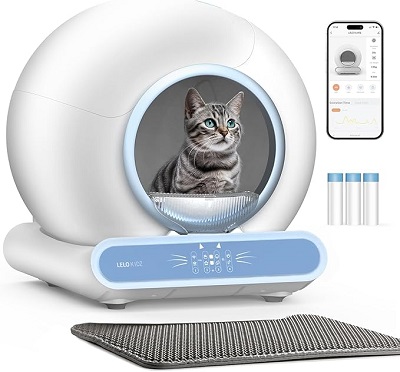
Devon Rex Cat Breed: The Playful, Affectionate, and Unique Companion
The Devon Rex is a unique and charming breed known for its curly coat, large ears, and affectionate personality. Often described as "pixie-like," this breed has a distinct appearance and an engaging personality that makes it a popular choice for families and cat lovers alike. The Devon Rex is playful, curious, and loves to be around people, making it an excellent companion for those seeking an interactive, loving cat.
In this guide, we’ll explore the history, appearance, temperament, grooming needs, and health considerations for the Devon Rex cat breed, providing you with everything you need to know about this delightful and energetic feline.
History of the Devon Rex Cat
The Devon Rex cat originated in the 1960s in Devon, England. The breed’s history traces back to a genetic mutation in a domestic cat named Kirlee, whose curly coat made her stand out from other cats. This mutation was then passed down through breeding, and the breed was formally recognized as the Devon Rex in the early 1970s.
The Devon Rex is often compared to the Cornish Rex, another curly-haired breed, but the Devon Rex’s curly coat is a result of a different genetic mutation. While the Cornish Rex has a longer and more delicate body, the Devon Rex is more muscular and has a pixie-like appearance. The breed’s unique coat texture and social, affectionate nature have made the Devon Rex a beloved companion in homes across the world.
Appearance of the Devon Rex Cat
The Devon Rex is known for its distinctive curly coat, large bat-like ears, and expressive face. Its appearance is unlike any other cat, which contributes to its “pixie” or alien look. Here’s a closer look at the breed’s most defining characteristics:
-
Coat:
The Devon Rex has a soft, curly coat that is the result of a genetic mutation. The fur is short, fine, and feels like velvet to the touch. Unlike most cats, the Devon Rex lacks the outer layer of guard hairs, giving it a fluffy, wavy texture. The coat comes in a variety of colors and patterns, including solid, tabby, tortoiseshell, and more. -
Eyes:
The Devon Rex has large, oval eyes that are wide-set and expressive. Their eyes come in a variety of colors, but they often have a bright, almond-shaped look that gives them an inquisitive and playful expression. The breed’s eyes are one of the most striking features, adding to its charm. -
Ears:
One of the most notable features of the Devon Rex is its large, bat-like ears. These ears are set low on the head, contributing to the breed’s overall alien appearance. The ears are wide at the base and point outward, making them a prominent characteristic of the breed’s face. -
Build:
The Devon Rex is a medium-sized, muscular cat with a slender yet well-muscled frame. Its body is compact and lightweight, giving it an agile and graceful appearance. The breed has a long, narrow neck and a short, tapering tail. Devon Rex cats have a distinctive and athletic build, which adds to their energetic and playful personality. -
Face and Expression:
The face of the Devon Rex is wedge-shaped, with high cheekbones and a prominent, short nose. Their large ears and expressive eyes combine to give them a look that is often described as pixie-like or elfin. The overall expression is one of curiosity, intelligence, and playfulness, which matches their energetic and interactive nature.
Personality of the Devon Rex Cat
The Devon Rex is known for its affectionate, playful, and curious nature. These cats are highly social, loving, and enjoy interacting with their human family members. Here are some key traits of the Devon Rex personality:
-
Affectionate and People-Oriented:
The Devon Rex is incredibly affectionate and loves to be the center of attention. They form strong bonds with their owners and are known to follow them around the house, seeking affection and companionship. These cats love to cuddle and often enjoy sitting on their owner's lap or sleeping beside them at night. They are typically very attached to their human family and enjoy constant interaction. -
Playful and Energetic:
Devon Rex cats are highly playful and energetic. They maintain their kitten-like energy throughout their lives and love engaging in games and activities. Whether it’s chasing a ball, playing with interactive toys, or just exploring new areas, the Devon Rex is constantly in motion. This breed loves to climb, jump, and explore high places, so providing climbing structures or cat trees will keep them entertained. -
Intelligent and Inquisitive:
The Devon Rex is highly intelligent and curious. They are quick learners and can be trained to do tricks, fetch, or even walk on a leash. Their natural curiosity means they enjoy exploring their environment and investigating new things. They are also adept at solving puzzles and often figure out how to open cabinets or doors, which can be both amusing and challenging for their owners. -
Good with Families and Other Pets:
The Devon Rex is typically very friendly and tolerant of children and other pets. These cats are social by nature and tend to get along well with other cats, dogs, and pets, especially when introduced properly. They thrive in homes where they receive plenty of attention and social interaction, and their affectionate nature makes them a great fit for families with children.
Grooming and Care
The Devon Rex has a short, curly coat that requires minimal grooming compared to other breeds. However, regular care is still essential to keep your cat healthy and comfortable.
-
Coat Care:
The Devon Rex’s curly coat doesn’t shed as much as a typical cat’s, but it can still benefit from occasional grooming. A gentle brush once or twice a week can help remove loose hairs and keep their coat in good condition. Some Devon Rex owners prefer to use a damp cloth to wipe down their cat’s coat, as this can help remove excess oils and dirt. -
Ear Care:
The large ears of the Devon Rex can accumulate earwax, so it’s important to clean them regularly. Use a cotton ball or soft cloth dampened with a gentle ear cleaner to wipe the inside of the ears and remove any wax buildup. -
Nail Trimming:
Regular nail trimming is important for the Devon Rex, as with any cat. Trimming the nails every couple of weeks helps prevent scratching damage and keeps the claws at a healthy length. -
Dental Care:
Dental hygiene is important for all cats, including the Devon Rex. Regular brushing with cat-safe toothpaste can help prevent gum disease and other dental issues. Additionally, dental treats or toys can help maintain good oral health.
Health and Lifespan
The Devon Rex is generally a healthy breed with a typical lifespan of 12 to 15 years. However, like all breeds, there are certain health concerns that prospective owners should be aware of.
-
Common Health Issues:
- Hypertrophic Cardiomyopathy (HCM): This genetic condition causes thickening of the heart walls and can lead to heart failure. Regular checkups and early detection are important.
- Skin Sensitivity: Due to their lack of guard hairs, Devon Rex cats may have sensitive skin and are more prone to sunburn. It’s essential to protect them from excessive sunlight.
- Ear Infections: Because of their large ears, Devon Rex cats are more prone to ear infections. Regular ear cleaning can help prevent this.
-
Lifespan:
The average lifespan of a Devon Rex is 12 to 15 years, with many living well into their teens when provided with proper care and attention.
Conclusion
The Devon Rex is an affectionate, energetic, and intelligent breed that makes an excellent companion for families, singles, and cat lovers alike. With its curly coat, large ears, and playful personality, the Devon Rex is sure to bring joy and excitement into any home. If you’re looking for a loving, curious, and interactive cat that will keep you entertained and snuggled, the Devon Rex is an ideal choice.
Affiliate Products
We may earn a small commission when you shop through our links — it helps us keep sharing love and care for every dog out there, at no extra cost to you.
Up to 75% Discount

Cat Sandbox Automatic Collector
BUY NOW »
Up to 55% Discount

Self Cleaning Litter Box
BUY NOW »


